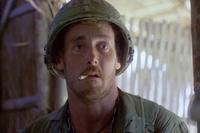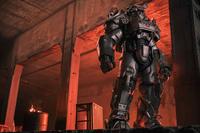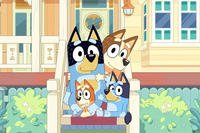Anchorman 2: The Legend Continues is out this week on Blu-ray in one of those ridiculously loaded packages that includes over four hours of special features. Director Adam McKay talked to us about how they ended up with so much Anchorman and reflects on why so many people think his movies are funnier the fourth, fifth, twentieth time they watch them.
If you're ranking favorite Will Ferrell movies, McKay's movies with the actor are going to dominate the leaderboard. They followed the original Anchorman with Talladega Nights: The Legend of Ricky Bobby, Step Brothers, The Other Guys and The Campaign, any of which might highjack a Saturday afternoon if you stumble across them while channel-surfing. McKay and Ferrell also started the Funny or Die website, home to many of the Internet's most viral videos. McKay's next movie will be The Big Short, based on he book about the 2008 financial meltdown by Moneyball and The Blind Side author Michael Lewis.
What's the plot of Anchorman 2? Something about Ron Burgundy moving the Channel 4 News Team to NYC to join the staff of a new 24-hour news channel. There's conflict with Ron's wife Veronica, conflict with the other anchors, flute-playing, an extended riff on Ice Castles and another news anchor street brawl with a dizzying number of cameo appearances.

Here's a short list of the extras in the home video release:
- There's a unrated version that adds 4 minutes of off-color to the theatrical version.
- There's a commentary track for the unrated version.
- There's a completely different cut of the movie that features "763 new jokes" culled from the alternate takes that usually get highlighted in the closing credits.
- There are behind-the-scenes featurettes that detail the RV, dog and shark effects, along with an extended look at how they built the movie's GNN newsroom.
- There are alternate takes, deleted scenes and gag reels.
- There's a video of the cast's first table read of the script, which makes the movie seem a lot less improvised than you might expect.
Ron Burgundy & Veronica Corningstone argue custody of their son Walter in a deleted scene from the Blu-ray.
McKay called on his lunch break from the set of Mission Control, an NBC pilot he's directing about the space program in 1962.
I watched the movie again yesterday and enjoyed it even more the second time, which is a pattern with movies you’ve directed. Are you trying to build movies that stand up to repeated viewing?
Well, not consciously. I'm such a movie fan and there are certain movies I watch over and over and over again. And what I always like about them is how dense they are, that there's layers. One of my all-time favorite movies is Diner and, obviously, everyone loves Goodfellas. Movies like that are just so dense.
I think the worlds end up being pretty dense in our movies, whether you like them or not. Part of comes from all the improv and alts we do and the fact that we rewrite our scripts so many times. Even though everyone thinks it's just a big, silly script, we actually work on them a lot.
With every single movie we've done, I've heard from lots and lots of people that the second time they watch it, they like it better than the first time. It's very interesting. Maybe we should start working on the first time viewing a little bit more, but I got to say, I love it because these movies hang around for ten years and that’s the ultimate compliment that people watch these things over and over again.
We had it once again with Anchorman 2, which actually did quite well. We got pretty good reviews and made a nice bundle of money, but, with sequels, you always have people go, “Ah, it's no good.” My response was always, “You don’t know yet. You don’t know until a year and a half from now.” That’s when you really know with all movies, whether they're gonna stick or not.
There's so many surprising movies that I find myself watching over and over again. Tinker, Tailor, Soldier, Spy. Who would have ever guessed I'd watch this movie over and over again? But it's so beautifully made – the design is so incredible and the acting is so good, I've seen that movie like five times. We can only control so much and try and plan so much. And at the end of the day, you don’t really know what a movie is until about a year and a half after it comes out.
At my house, we joke they should have the Oscars for the movies that came out three years ago.
How about it? By the way, that’s really true. Like Goodfellas or all of Scorsese's movies from the 70's and 80's. There's so many films that you realize later were clearly the best movie of that year.
I think the trick is the marketing. I think that’s what it's about. With these movies, depending on the budget, there’s anywhere from 20 to 100 million dollars worth of money being thrown in the pond and that money just creates ripples. It plays with perception. It changes people's expectations. By the time you're walking into the movie theater, you’ve been heavily marketed. And obviously that’s a good thing. We want people to go see our movies, so in no way do I mean that in a negative way. But then I think later when you're watching it on DVD or TV, it's such a clean watch. There's no noise. You just get to watch the movie.
I really enjoyed the alternate version of the movie. At what point did you decide you were going to make a completely separate cut for the Blu-ray?
During editing of the theatrical version, we kept talking how we could cut some of the scenes 20 different ways. My editor, Brent White, said, “I think you could do a whole version of this movie with completely different jokes.” And I go, “That's crazy.” And then I started looking at the little cards we have for the edit, that tracked the movie, and I started looking at it and going, “Well, we could do it there. We could do it there.” And then I realized he was right.
So we had another one of our editors, Jay Deuby, who normally works with the Duplass Brothers. Excellent editor. Once the theatrical started getting to 90 percent done, he started editing this alt version and we all had lunch one day on the sound stage and watched it. And we're like, “I can't believe it. That can work.” And then we reedited it one more time. I never knew they were going to put it in theaters. I couldn’t believe when that happened. That was crazy. I think they actually made a profit. That was the other thing that shocked me too was I thought, oh, they're going to put it out and it'll make $100,000. I think they did over 2 million dollars on that movie for no production cost and very little marketing.
There's also the alternate version of the first "Anchorman" and there are things about that cut that I like even better than the original movie. You’ve done it twice now.
I agree with you. Studio movies are a big-tent endeavor, so you're trying to get your film to play for large crowds, but yet you're still trying to keep the personality of the movie. Sometimes there are jokes that are too idiosyncratic for a 400-seat theater out in the suburbs.
So a lot of times some of my favorite jokes will end up in those alt cuts. There's no doubt there's about six or seven of those in this Anchorman 2 alternate version. And that’s certainly true with the first one, too, but not as much. That one’s based around a storyline that we cut, but there's still a couple bits in that first one that really make me laugh.
Your next movie will be a bit of a departure.
Michael Lewis’ The Big Short. I love that book and I read it in one night. I couldn’t put it down. Sometimes when someone reads a great book or sees a great movie, they can't shut up about it. I think I annoyed all my friends by saying, “This book is the craziest thing. It’s about credit default swaps and exotic financial instruments and mortgage rates and I couldn’t put it down.” Michael Lewis is really gifted at getting across these seemingly boring ideas, but the real truth is they're not boring at all.
I thought there was some Michael Lewis influence in "The Other Guys."
My whole goal with that movie was can you do the financial collapse as a terrible story underneath a comedy. That’s what I was trying to do. And I think we succeeded in some ways and not in other ways. There was some talk that we were going to talk to Michael Lewis at one point, but I don’t know if we ever connected.
We were trying to simplify this financial crisis, something which a lot of people had very vested interests in making incredibly complicated and confusing.
On the "Anchorman 2" Blu-ray, it was good to see the table read, because, in spite of the reputation you guys for making these improv movies, a lot of scenes were pretty much intact in the original script.
People ask me how much of it's improvised. It’s only about 20 percent. It's not as much as you think, and we write the scripts to have that kind of free-form feeling. That’s what we're going for with what we write. So I always hear people say, “Ah, they're just goofing around on set.” No, we did nine versions of that script. We write for months and months and months.
I thought another recent movie that did it really well was This is the End. It kind of had that kind of free-form, loose feeling to it. It's hard to do that. It's hard to get that kind of vibe. So anytime I hear someone say that they think it's all improvised, I'll take that as a compliment.




